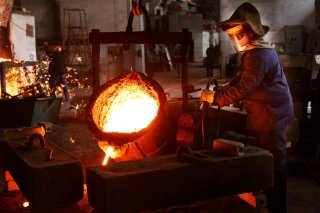Joe Biden's Shocking Decision to Block the Nippon Steel Deal
Even as the Biden administration has imposed sanctions on thousands of Russian companies and individuals, the White House has avoided imposing sanctions on the Russian steelmaker. As a point of comparison, the Franklin Delano Roosevelt administration cut off exports of steel, scrap iron, and various other metals and metal products in an escalating wave of sanctions on Imperial Japan during the Second World War.
It was not shocking that the Committee on Foreign Investment in the United States sought to defer a decision on Nippon Steel’s $14 billion offer to acquire Pennsylvania’s U.S. Steel until after the November 5 presidential election. What is shocking is President Joe Biden’s decision to block the transaction over concerns about foreign ownership.
In a White House statement, Biden asserted that blocking the takeover promotes U.S. national security and “resilient supply chains” by maintaining a “strong domestically owned and operated steel industry.” This would be considerably more persuasive if a Russian steel company, NLMK, did not already own three sites in Indiana and Pennsylvania at a time when Russian officials assert that Washington is “in a state of indirect war” with Russia.
Indeed, even as the Biden administration has imposed sanctions on thousands of Russian companies and individuals, the White House has avoided imposing sanctions on the Russian steelmaker. As a point of comparison, the Franklin Delano Roosevelt administration cut off exports of steel, scrap iron, and various other metals and metal products in an escalating wave of sanctions on Imperial Japan during World War II in the summer and fall of 1941; these policies, together with a U.S. oil embargo, aimed to punish Tokyo for its war in mainland China—not dissimilar to the current effort to impose costs on Russia for its invasion of Ukraine. This is not to say that an export ban of that time should be applied today, but it is striking that sanctions were used in an analogous situation but have not been used now.
The administration has not offered a public explanation for its restraint. Or, for that matter, for how its insistence that projects funded by the Infrastructure Investment and Jobs Act use domestically produced steel. The administration’s formal guidance, which the director of the White House Office of Management and Budget issued two months after Russia’s invasion of Ukraine, did not make a distinction between steel produced domestically by American companies and that produced domestically by foreign-owned firms like NLMK USA, the Russian company’s U.S. subsidiary.
An earlier failed bidder for U.S. Steel, the American company Cleveland-Cliffs, apparently still hopes to buy all or part of the company, something that one analyst suggested could prompt antitrust objections, and to buy NLMK’s American facilities. Cleveland-Cliffs praised Biden’s September action to block the U.S. Steel takeover before the election.
One could make a case that a successful Cleveland-Cliffs acquisition of most or all of U.S. Steel, and NLMK USA, would strengthen the American steel industry. Moreover, this would usefully ease the Russian firm out of the U.S. market, in a manner respectful of the law and of property rights, unlike Russia’s approach to some U.S. and European companies. Considering American concerns about a potential future conflict with China, and that Russia’s invasion of Ukraine has demonstrated the endurance of twentieth-century industrial war, there are significant national security reasons to increase domestic steel production capacity. In 2023, America’s total steel production was only about one-tenth of China’s. U.S., Japanese, South Korean, and German steel production combined reached only one-third of China’s.
Yet this is not the case that the Biden administration is making. Instead, U.S. officials appear to be facilitating that outcome without acknowledging it.
Paul J. Saunders is President of the Center for the National Interest and a member of its board of directors. His expertise spans U.S. foreign and security policy, energy security and climate change, U.S.-Russia relations and Russian foreign policy, and U.S. relations with Japan and South Korea. Saunders is a Senior Advisor at the Energy Innovation Reform Project, where he served as president from 2019 to 2024. He has been a member of EIRP’s board of directors since 2013 and served as chairman from 2014 to 2019. At EIRP, Saunders has focused on the collision between great power competition and the energy transition, including such issues as energy security, energy technology competition, and climate policy in a divided world. In this context, he has engaged deeply in energy and climate issues in the Indo-Pacific region, especially U.S. relations with Japan and South Korea. His most recent project at EIRP is an assessment of Russia’s evolving role in the global energy system.
Image: Shutterstock.

